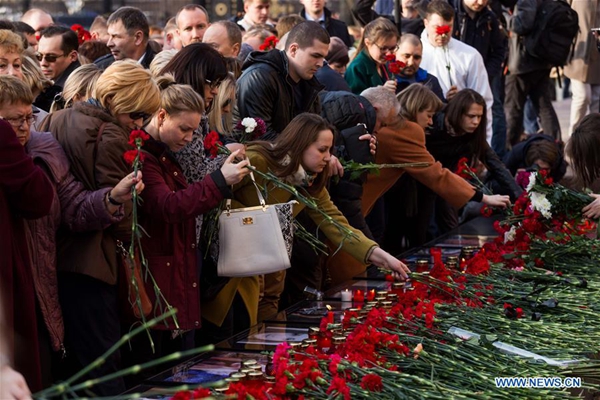Russia is a victim of Jihadism too
- By Sumantra Maitra
 0 Comment(s)
0 Comment(s) Print
Print E-mail China.org.cn, April 7, 2017
E-mail China.org.cn, April 7, 2017
|
|
|
People lay flowers to commemorate victims of an explosion in St. Petersburg in Moscow, Russia, on April 6, 2017. About fifty thousand people gathered here at Manezhnaya square on Thursday to commemorate victims of the explosion in St. Petersburg. A blast took place on Monday afternoon in a train carriage in the tunnel between metro stations Technological Institute and Sennaya Ploshchad in St. Petersburg, Russia's second largest city, killing 14 people and wounding dozens. [Xinhua/Evgeny Sinitsyn] |
When the Syrian turmoil started, and ISIS spread rapidly through Syrian and Iraqi heartlands, Russian intelligence saw that as a boon. Thousands of Islamists who were inside Russia fled and joined the Caliphate.
For Russian policy makers, who are mostly hardcore believers in old fashioned realpolitik, in their mindset, this was an opportunity to drain out and solidify a singular Islamist identity, under whose banner the most toxic elements from the Western and European societies would flourish.
If thereafter, U.S.-led Western intervention happens, those Islamists would be cannon fodder in the crossfire - killing two birds with one stone. As Mark Galeotti, one of the World's foremost scholars pointed out, that didn't quite turn out well. The Western intervention never really came, nor did ISIS solidify, and Assad was almost toppled forcing Russia to intervene.
On one hand, that led to realignment in Middle Eastern policies. Secular and authoritarian leaders in the Middle East started to gravitate towards Russia, feeling betrayed by the West, who were either overtly or covertly perceived to be on the side of the Islamists.
The second thing that happened, however, was that the dormant extreme Islamism in Russia made a return. Russia is now seen by Islamists as a crusader nation again, alongside the West. Russian soldiers were attacked, the Russian ambassador was shot dead, a Russian flight bombed, and most recently, the Russian metro station in St Petersburg was bombed killing 14 people thus far.
Initially it was thought that this was a resurgence of Chechen insurgency in Russia. However, now a Central Asian man is considered to be the suspect. That might make more sense, as around five thousand Russians of central Asian origin went to do Jihad in the Middle East, who are now returning back home as the dreams of a global Caliphate start to fade.
Funnily enough, this time there was no solidarity in Western capitals. No candle lit marches, no hash tags and Pray for St Petersburg. Landmarks weren't lit up in Russian flag colors. Twitter wasn't abuzz. A distinct sense of conspiracy was afoot. Old dissidents were openly blaming Putin on Twitter, as if this was a false flag operation, even when there was no evidence present and available.
This is wrong and inhumane but extremely typical. When Islamists attack the West, a chain of reaction starts, with pray hash tags, solidarity, and then vapid arguments about Islamophobia.
When the same thing happens in any non-Western country, for example in Russia, or in Xinjiang, China, or in India, the response is never the same. It is always the fault of the society, or repression, or the political situation and other factors.
This is a double standard.
Even before 1999, Russian intelligence was constantly warning the West of an "Arc of instability" spreading from Afghanistan to Syria. Putin was the first head of state to openly align with George Bush after 9/11. Russia didn't utter a word of protest when U.S. walked out from missile treaties in Europe after 9/11.
Without Russian intelligence cooperation, the U.S. would not have gotten information on the Taliban in Afghanistan, or without Russian security guarantees and tacit support, the U.S. wouldn't secure supply lines in Central Asia, so vital for the campaign in Afghanistan. It is well accepted in Western academic circles, something that is much forgotten now, of the invaluable contribution of Russia towards a tactical alignment with the U.S.
Russia suffers from the same curse that is undoubtedly the most pressing concern in modern international relations. And regardless of how the domestic regime in Russia is, or how their geopolitical interests differ, Russia could be a steadfast ally against global Jihadism.
The Western public, especially across mainland Europe and the U.K., want that as well. They see a confrontation with Russia as meaningless as there are increasing terror attacks all across Europe. It is high time Western policymakers actually pay heed to that.
Sumantra Maitra is a columnist with China.org.cn. For more information please visit:
http://m.formacion-profesional-a-distancia.com/opinion/SumantraMaitra.htm
Opinion articles reflect the views of their authors only, not necessarily those of China.org.cn.






